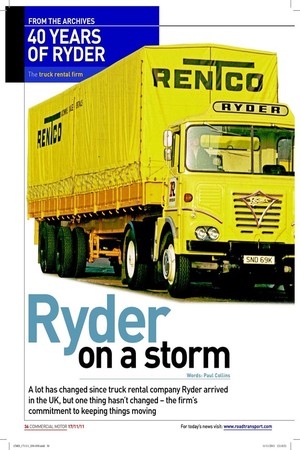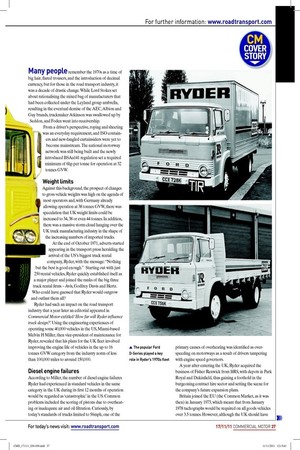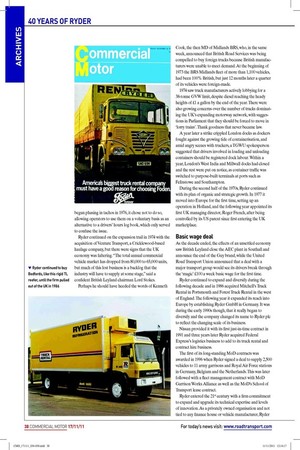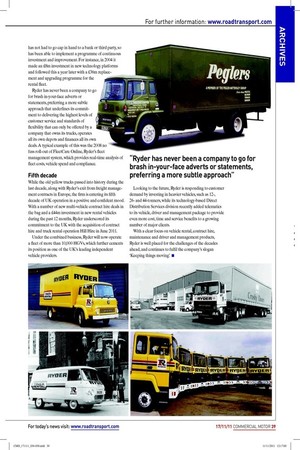y der
Page 27

Page 28

Page 29

Page 30

If you've noticed an error in this article please click here to report it so we can fix it.
on a storm
Words: Paul Collins
A lot has changed since truck rental company Ryder arrived in the UK, but one thing hasn’t changed – the firm’s commitment to keeping things moving
Many people remember the 1970s as a time of big hair, lared trousers, and the introduction of decimal currency, but for those in the road transport industry, it was a decade of drastic change. While Lord Stokes set about rationalising the mixed bag of manufacturers that had been collected under the Leyland group umbrella, resulting in the eventual demise of the AEC, Albion and Guy brands, truckmaker Atkinson was swallowed up by Seddon, and Foden went into receivership.
From a driver’s perspective, roping and sheeting was an everyday requirement, and ISO containers and new-fangled curtainsiders were yet to become mainstream. The national motorway network was still being built and the newly introduced BSAa141 regulation set a required minimum of 6hp per tonne for operation at 32 tonnes GVW.
Weight limits
Against this background, the prospect of changes to gross vehicle weights was high on the agenda of most operators and, with Germany already allowing operation at 38 tonnes GVW, there was speculation that UK weight limits could be increased to 34, 38 or even 44 tonnes. In addition, there was a massive storm cloud hanging over the UK truck manufacturing industry in the shape of the increasing numbers of imported trucks.
At the end of October 1971, adverts started appearing in the transport press heralding the arrival of the US’s biggest truck rental company, Ryder, with the message: “Nothing but the best is good enough.” Starting out with just 250 rental vehicles, Ryder quickly established itself as a major player and joined the ranks of the big three truck rental irms – Avis, Godfrey Davis and Hertz. Who could have guessed that Ryder would outgrow and outlast them all?
Ryder had such an impact on the road transport industry that a year later an editorial appeared in Commercial Motor entitled ‘How far will Ryder inluence truck design?’. Using the engineering experiences of operating some 40,000 vehicles in the US, Miami-based Melvin H Miller, then vice-president of maintenance for Ryder, revealed that his plans for the UK leet involved improving the engine life of vehicles in the up to 16 tonnes GVW category from the industry norm of less than 100,000 miles to around 150,000.
Diesel engine failures
According to Miller, the number of diesel engine failures Ryder had experienced in standard vehicles in the same category in the UK during its irst 12 months of operation would be regarded as ‘catastrophic’ in the US. Common problems included the scoring of pistons due to overheating or inadequate air and oil iltration. Curiously, by today’s standards of trucks limited to 56mph, one of the primary causes of overheating was identiied as overspeeding on motorways as a result of drivers tampering with engine speed governors.
A year after entering the UK, Ryder acquired the business of Fisher Renwick from BRS, with depots in Park Royal and Dukinield, thus gaining a foothold in the burgeoning contract hire sector and setting the scene for the company’s future expansion plans.
Britain joined the EU (the Common Market, as it was then) in January 1973, which meant that from January 1978 tachographs would be required on all goods vehicles over 3.5 tonnes. However, although the UK should have begun phasing in tachos in 1976, it chose not to do so, allowing operators to use them on a voluntary basis as an alternative to a drivers’ hours log book, which only served to confuse the issue.
Ryder continued on the expansion trail in 1974 with the acquisition of Venture Transport, a Cricklewood-based haulage company, but there were signs that the UK economy was faltering. “The total annual commercial vehicle market has dropped from 80,000 to 65,000 units, but much of this lost business is a backlog that the industry will have to supply at some stage,” said a conident British Leyland chairman Lord Stokes.
Perhaps he should have heeded the words of Kenneth Cook, the then MD of Midlands BRS, who, in the same week, announced that British Road Services was being compelled to buy foreign trucks because British manufacturers were unable to meet demand. At the beginning of 1973 the BRS Midlands leet of more than 1,100 vehicles, had been 100% British, but just 12 months later a quarter of its vehicles were foreign-made.
1974 saw truck manufacturers actively lobbying for a 38-tonne GVW limit, despite diesel reaching the heady heights of £1 a gallon by the end of the year. There were also growing concerns over the number of trucks dominating the UK’s expanding motorway network, with suggestions in Parliament that they should be forced to move in ‘lorry trains’ . Thank goodness that never became law.
A year later a strike crippled London docks as dockers fought against the growing tide of containerisation, and amid angry scenes with truckers, a TGWU spokesperson suggested that drivers involved in loading and unloading containers should be registered dock labour. Within a year, London’s West India and Millwall docks had closed and the rest were put on notice, as container trafic was switched to purpose-built terminals at ports such as Felixstowe and Southampton.
During the second half of the 1970s, Ryder continued with its plan of organic and strategic growth. In 1977 it moved into Europe for the irst time, setting up an operation in Holland, and the following year appointed its irst UK managing director, Roger French, after being controlled by its US parent since irst entering the UK marketplace.
Basic wage deal
As the decade ended, the effects of an unsettled economy saw British Leyland close the AEC plant in Southall and announce the end of the Guy brand, while the United Road Transport Union announced that a deal with a major transport group would see its drivers break through the ‘magic’ £100 a week basic wage for the irst time.
Ryder continued to expand and diversify during the following decade and in 1986 acquired Mitchell’s Truck Rental in Portsmouth and Forest Truck Rental in the west of England. The following year it expanded its reach into Europe by establishing Ryder GmbH in Germany. It was during the early 1990s though, that it really began to diversify and the company changed its name to Ryder plc to relect the changing scale of its business.
Nissan provided it with its irst just-in-time contract in 1991 and three years later Ryder acquired Federal Express’s logistics business to add to its truck rental and contract hire business.
The irst of its long-standing MoD contracts was awarded in 1996 when Ryder signed a deal to supply 2,500 vehicles to 11 army garrisons and Royal Air Force stations in Germany, Belgium and the Netherlands. This was later followed with a leet management contract with MoD Garrison Works Alliance as well as the MoD’s School of Transport lease contract.
Ryder entered the 21st century with a irm commitment to expand and upgrade its technical expertise and levels of innovation. As a privately owned organisation and not tied to any inance house or vehicle manufacturer, Ryder
has not had to go cap in hand to a bank or third party, so has been able to implement a programme of continuous investment and improvement. For instance, in 2004 it made an £8m investment in new technology platforms and followed this a year later with a £36m replace ment and upgrading programme for the rental leet.
Ryder has never been a company to go for brash in-your-face adverts or statements, preferring a more subtle approach that underlines its commit ment to delivering the highest levels of customer service and standards of lexibility that can only be offered by a company that owns its trucks, operates all its own depots and inances all its own deals. A typical example of this was the 2008 no fuss roll-out of FleetCare Online, Ryder’s leet management system, which provides real-time analysis of leet costs, vehicle spend and compliance.
Fifth decade
While the old yellow trucks passed into history during the last decade, along with Ryder’s exit from freight management contracts in Europe, the irm is entering its ifth decade of UK operation in a positive and conident mood. With a number of new multi-vehicle contract hire deals in the bag and a £44m investment in new rental vehicles during the past 12 months, Ryder underscored its commitment to the UK with the acquisition of contract hire and truck rental operation Hill Hire in June 2011.
Under the combined business, Ryder will now operate a leet of more than 10,000 HGVs, which further cements its position as one of the UK’s leading independent vehicle providers. Looking to the future, Ryder is responding to customer demand by investing in heavier vehicles, such as 12-, 26and 44-tonners, while its technology-based Direct Distribution Services division recently added telematics to its vehicle, driver and management package to provide even more cost, time and service beneits to a growing number of major clients.
With a clear focus on vehicle rental, contract hire, maintenance and driver and management products, Ryder is well placed for the challenges of the decades ahead, and continues to fulil the company’s slogan ‘Keeping things moving’. ■










































